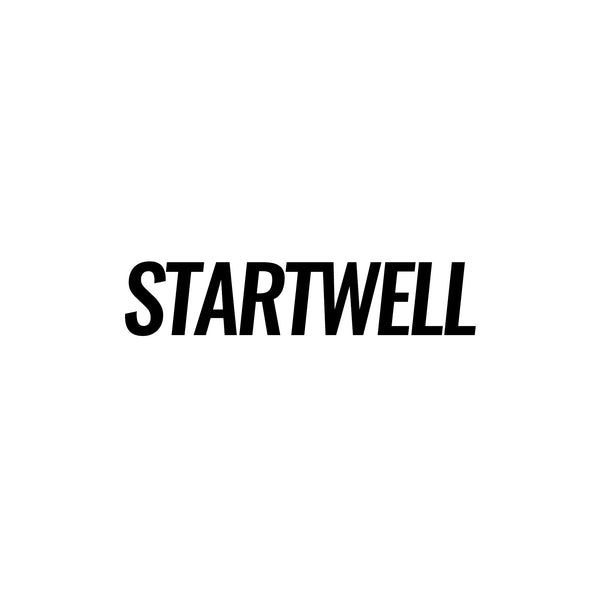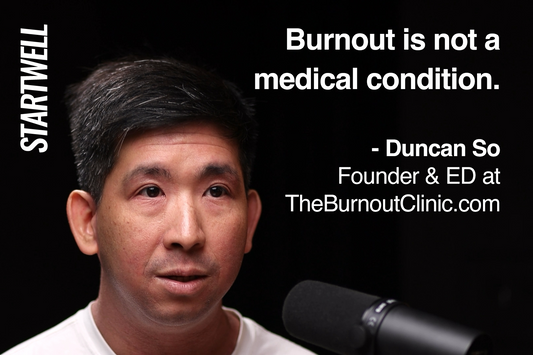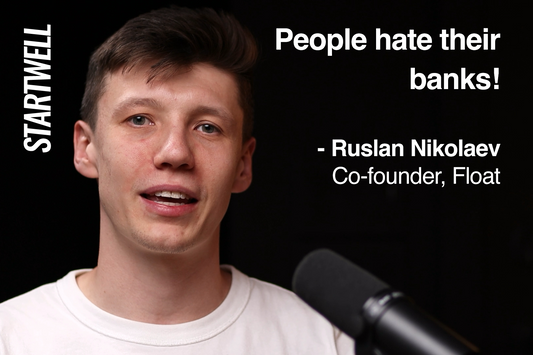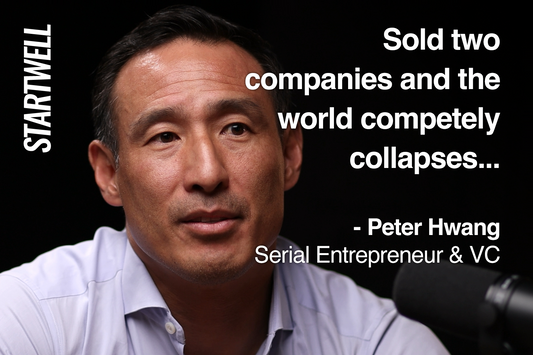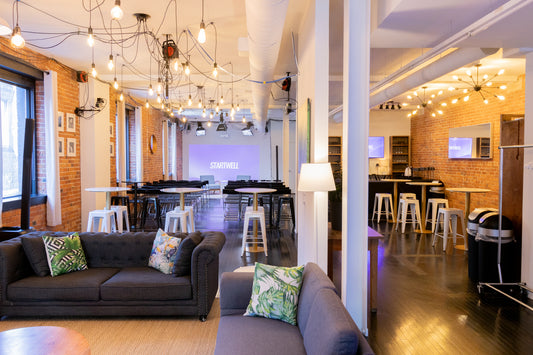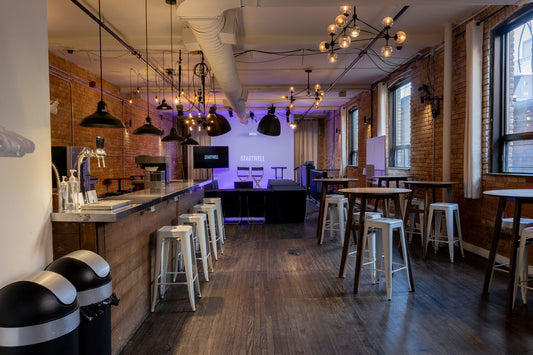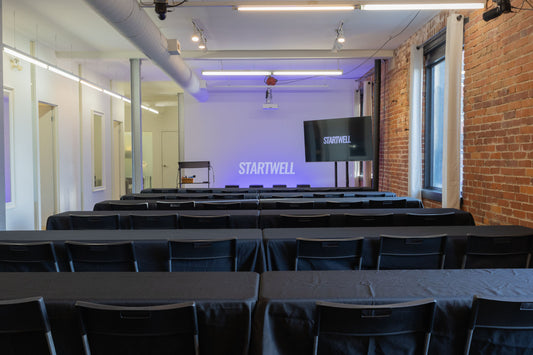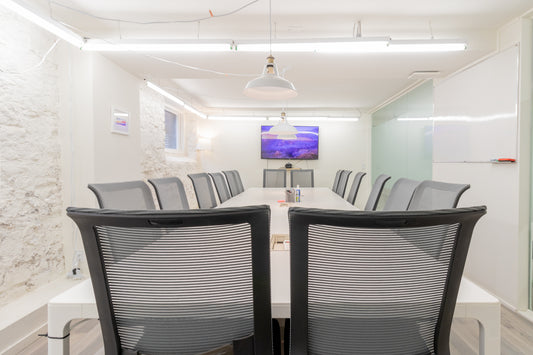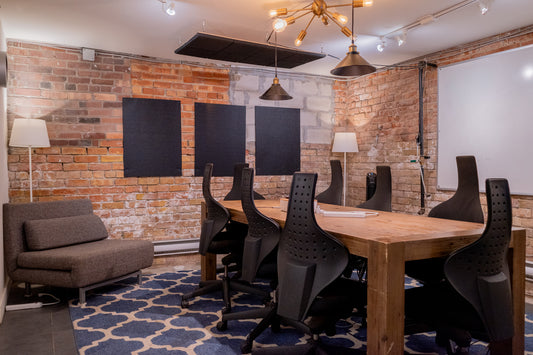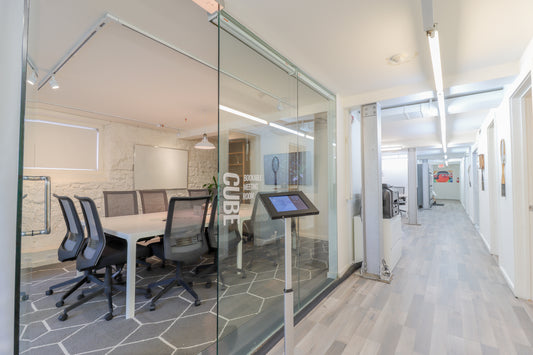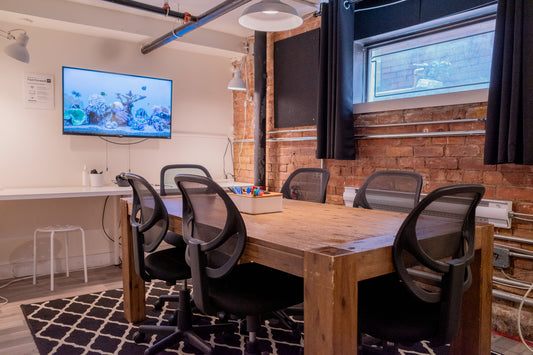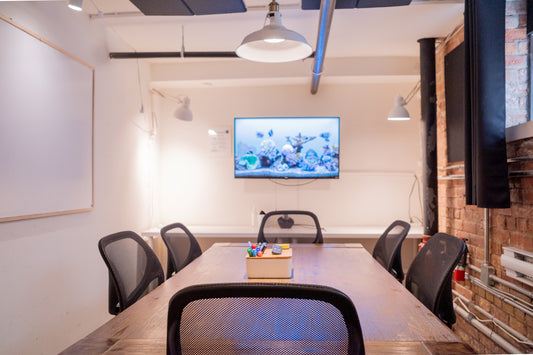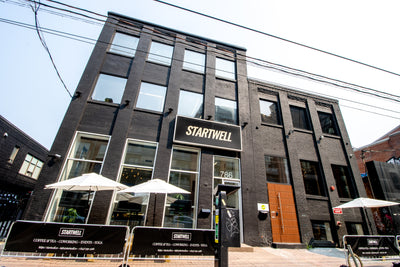Roy Pereira's history in tech started in the 1990s - he saw the first boom-bust cycle and has since founded and exited a few startups.
For this, the 59th episode of the StartWell Podcast, Roy shares his experiences and perspectives as a startup founder, tech innovator, investor and Torontonian.
His current occupation is as a cofounder of Unified - a simple way for companies to unify data between multiple SaaS applications.
Read through the full video podcast transcript
The COVID-19 pandemic's impact on entrepreneurs and their mental health.
Roy Pereira 0:00
So that was my first time in network security. I spent whatever, three, three years at the startup, doing their security, came up with a lot of internet standards, like virtual private networking. If you're doing VPN from your laptop, to your office, I came up with that in Ottawa in 1998. And we patented and then we gave it out what we gave it,
Qasim Virjee 0:20
creating VPNs Oh, yeah, yeah.
Roy Pereira 0:22
What entrepreneurs are forced to do right now is to go out and make revenue, right? You cannot assume that you're going to get this magical funding. Unlike during COVID. Obviously, with 0% interest, we saw this this, I call a dot COVID. eventbrite.com. Yeah. But really, it was like a co confused valuation party. Yeah, it just kept getting higher and higher and higher, until it broke.
Qasim Virjee 0:49
Founded in 2017, start well, is Toronto's independent hub for innovators to collaborate, our podcasts relate perspectives from the world's most diverse urban population to reflect unique insights into global business, media, and culture?
Qasim Virjee 1:10
For me, I challenged myself with the pandemic and I said, You know what, you got to have fun because as an entrepreneur, it's such a curious challenge to have to create value when there's not even a market.
Roy Pereira 1:27
Yeah, I think there's so many directions we can go with talking about the pandemic, right. It's a black swan event. You and I've never seen it. Nobody's who's been alive? And so what do you do? And I think as entrepreneurs, I think we're all always looking for that opportunity that, that blank slate to invent. And so I think for some of us, it was like, Yeah, okay, what are we going to do? Right? I can, you know, there's a problem, what's going to fix it. But I also think that as entrepreneurs, or anybody, I, what I saw was that nobody understood their mental condition, and the how that was causing them to actually not be at their best
Qasim Virjee 2:11
for her, right. And so in, everything was
Roy Pereira 2:13
changing. Every few everything was changing. It was stage 1234. I told everybody that we'd be back in the office in two weeks. Yeah, right. I was bullshitting. And then like six months later, two years later, that kind of stuff. So there's a lot of unknown unknowns. Sure. Entrepreneurs like that some. But yeah, there was a lot of opportunity to reflect, you have to look at how we were operating before. Do we want to continue that? So my favorite mental game was like, when this is over? What are we going to learn? And what are we going to do different? Because it was almost like a reset? Yeah. And I was looking forward to that. And it's sort of like, it wasn't over. Like, there wasn't a moment when you put your finger on. This is over. Scott, let's move on. Let's be better people. Let's do something different. So it's not like a New Year's resolution? Yeah, we're like January 1, you've changed
Qasim Virjee 3:06
2020 felt like that initially, because it was like at home. And then it was a couple of seasons that went by, and then it was like, okay, winter, we're gonna hibernate anyway. And then spring, will we come out of this? And then yeah, going and kept going. And then at that point, I think
Roy Pereira 3:18
kept going in, I think that I started to, yeah, everyone started to lose it. Because we all thought that it was just one phase. Right? It would hit it would go away. The fall of 2020. It was over. Yeah, kind of thing. Or maybe the spring? Yeah, maybe this summer, and then it just kept going and going and going. Yeah, it was really interesting. I think. I think everyone hopefully learned something from it. That's what my point was that, you know, you'd come out of this, and you'd be like, what that I've learned from that. Right? You know, like, what's more important, you know, hanging out with my family going to work spending an hour on on the train? Maybe not. Right. And I think that that also, when you look at a city like Toronto, where we're not going back to work, and nobody really wants to go back to work for lots of different reasons, not just because transit, in the delays. But I think I think we've all learned that there are some things more important than showing up to work every day. Yeah,
Toronto's cultural diversity and tech industry growth
Qasim Virjee 4:16
I mean, I look, this is where I start putting on my sociologists hat and I say taking a step back, something I've always believed about the city, right? This is a historically nine to five very Anglo Saxon kind of city. This is a city where people like clock in and clock out. Traditionally, the bulk of our economy in the city is made up of employment within either government or large institutional kind of style enterprise. So the nature of work for office workers, white collar workers has been very like Dilbert comic, comic esque, right. People take a train, they travel into the city from their suburban house. Then they like try and not poop all day long in the office and hold it all in and chuckle and stay Apple things and then like, go home and relax, right?
Roy Pereira 5:02
And then go to their cottage. Yeah,
Qasim Virjee 5:05
they bought one before the last four years, right? If they could afford one before,
Roy Pereira 5:08
you know, I think you're painting a picture of 2000 Toronto, you know, or 1990s. Toronto. Yeah. And I moved here in 2003 from the valley. And, you know, I'm Canadian. I grew up in Ottawa and all this, but it fascinated me how the Toronto that I remember growing up the white, very, nine to five big buildings, finance, mining insurance. It was starting to change, right. But you could still see it, it was still around, right. And it was sort of like this tug of war. And you saw a lot more immigrants coming in, you saw a lot more tech people coming in, and a burgeoning tech industry.
Qasim Virjee 5:50
That was the start of the tech scene. Yeah. And nobody believed that,
Roy Pereira 5:53
you know, we could do tech. I mean, Ottawa was tech, you know, maybe Waterloo was tech, but not Toronto, right. And over the last 20 years, we've grown into, you know, the third largest tech hub in North America. But I think we've also changed our culture. Right? We're not Silicon Valley north, we've never we're, we're Toronto, and we're, we're proud of it. And to your point, it's no longer the mostly white going to tall building nine to five. But that's not just toronto, toronto is so much more now. Right? And it encompasses you, it comes as me It encompasses new immigrants coming in deciding to come to Toronto instead of going to the valley. Yeah, right from all over the world. And so we're getting the best here. And we're also getting quite a lot of different cultures, which we always had
Qasim Virjee 6:44
a cultural diversity, of course, in Toronto, for our listeners all over the world, you know, by whatever stat, I've read in the last two decades has been consistently saying that like, yes, the city has the largest per capita cultural diversity. Right? If you were
Roy Pereira 7:02
sent were born outside of Canada. Yeah, I live in the city of Toronto. And that just adds to our strength, right? Totally, man.
Qasim Virjee 7:09
Totally. I mean, like, I used to, when I had time to mentor early stage startups years ago, I would always say this, I was always I would always say that, like, there are ways in which you can prototypically test foreign markets by looking inwards at the Canadian diversity that we have and say, Well, if you want to living access to a country that you might want to open an office to, there are people that know that country very well down the road from you. So like, you don't need to make a business trips before you talk to people about that place, you know, and all that kind of stuff. Yeah, you
Roy Pereira 7:42
know, I'm, I'm obviously a product guy, I talk a lot about product. And my last company, I remember talking to, you know, customers out in Europe, and they were fascinated that we had timezone support for them, you know, and language support we multilingual, multi timezone around the world. And that was different than what we saw with our competitors from the States. Yeah, who just didn't think about that. to Toronto, we think about that, because we're not, yes, we are in North America. We're a massive city in North America. But we're a city made up of people from all over the world. And we ask them, you know, where are you from, and where we actually want to know. And so we care about that. And it's, we know that we're just not alone here in our little city, even though most Canadians look at Torontonians and think that we're full of shit and for ourselves, which is true as well, because this is the damn best city. But
Toronto's growth and infrastructure challenges
Qasim Virjee 8:38
yeah, it's like the best worst city. We're like, the best worst city is infrastructurally doesn't work. Yeah, like clunky. You're like it's spread out. But yet there's density. The density is residential, but it's not like blending into pedestrian reality. And it's like, there's lots of problems from a kind of, you know, totally,
Roy Pereira 8:58
totally I think Toronto is in this infrastructural side,
Qasim Virjee 9:01
there's a lot of problems, but there's a lot of good people. There's a lot of people that have a want to enjoy living together, which is good.
Roy Pereira 9:08
Toronto has to decide what kind of city you want. It's in this, this transitionary period as it grows. Yeah, it's growing phenomenon, right? There's so many cranes, construction cranes out here more than any other city in the world. And I think it has to figure out what kind of city wants it because it can't continue to be the Old City, just like we were talking about Toronto in 1990s. Being this, the city that arrested Madonna for Edina dingy city, we're no longer playgrounds.
Qasim Virjee 9:36
public park playgrounds are closed on Sundays when I moved here from New York in 2005. They were closed on Sundays like people went to them. But there were signs that said this park is closed. The LCBO was closed on Sundays. Yeah, except for the one on Queen skeet so you could not buy alcohol or playing a playground on a Sunday because you have to be at church in 2005 I
Roy Pereira 10:00
wasn't that long ago. No, that was less than 20 years. Yeah. Right. And so that's my point. Like, we're, I think changing again, we're going through another pivotal moment. Yeah. And so you see this war of, you know, I need my car to drive anywhere, or like, I need to do public transit or even biking, because you just can't keep driving. You know, there's so many more people, you know, and when you look at larger cities around the world, I think they've gone through those tough times. And I think Toronto has not. And that's the, the issue that we're getting into right now. Like, what does my Toronto look like? Because it can't look like what it was before. There's just too many people here, and you can't stop them coming. Alright.
Qasim Virjee 10:38
So let's talk about your Toronto in the lens of your business life. Okay, wait, you move here from the valley. And when? So
Roy Pereira 10:46
I came here in 2003. I remember. There was two reasons. One, my wife and I wanted to start a family and we want to do it back home. And to George W. Bush just won his second term. And I'm like, This is crazy. Why Why would a country vote for this type of President? Right? You know, he seems pretty good. In the last 20 years, looking back, but yeah, those are two reasons. I want to come back buy a house. And we were living in the valley homes were just so incredibly expensive. Yeah, you know, 2 million bucks for some tiny little 600 foot shack that needed to be demolished, you know, right. And so we wanted a real family life. So we came back, folks were getting older as well. We didn't want to go back to Ottawa, which is where I grew up, wanted to go to a big city, Toronto deserts. Yeah. And I started working with some publicly traded companies, actually, tech companies. So I just came out of Cisco Systems in the valley. And I thought that's what my career was. Okay, so I had this vision 10 year vision to be the CEO of a publicly traded company. Right, that was the goal and always need goals. And so came up. You know, I was an executive at Cisco. But you know, I came up to be a VP of product and marketing at a publicly traded company. I thought we did really well, for X on the public markets. You know, that was awesome. But I realized one day, I was sitting in the boardroom looking around, I'm like, This is not for me. This is where I'm going to be in 10 years. And I looked around and I looked at my future selves. And I'm like, That's not me. I'm not that person. You know, I know I'm, how old was I? Late 30s. Okay, I thought I was old. And I'm like, I don't want to be this old. Right. You know, you're aging fast and aging fast. So yeah, I think it was one of those pivotal moments where you, you look at how have I accomplished what I really want to do? Am I in a position that I really need to do this every like 10 years or so? Midlife crisis is every decade Wiechmann. During COVID, probably was every week. And I just decided, you know, what I really loved is the time that I did those startups before, back in the late 90s.
Qasim Virjee 13:02
And so I we rewind, okay, so what startups were doing in late 90s, this is like.com, boom, bust. Yeah. What were we
Entrepreneurship, technology, and career development
Roy Pereira 13:11
so I did my first startup after university, dropped out of university got bored of coding elevators, you know, and people press buttons. That was one of the tasks I think, you know, you think back these memories, and it's like, what caused me to like, move that, you know, when the professor asked me to build that, and I'm like, There's no way I'm going to build that that's boring as hell, I could do that. And I'm like, this sucks. I want it I one some real life experience. So I actually dropped out of university. Oh, went to work, realize that I was really good at computers, programming and did a start up. And then what was it? Man, it was totally embarrassed. No, you can do so long ago. But it was basically getting people on the internet. Early days. Yeah,
Qasim Virjee 13:59
that's what I used to do it I school modems and all those good ISP, you started an ISP or we
Roy Pereira 14:04
were building software for ISPs for that. For the first ISPs. We actually sold a piece of our software to AOL. What did it do? It got people on on the internet. So you dial into their bulletin board, their modems, and all of a sudden use like an operating system
Qasim Virjee 14:19
for ISPs,
Roy Pereira 14:21
something like that. Yeah. It was fun. After four years,
Qasim Virjee 14:25
because, you know, when I was like, like, 15 in 95, I was living in Nairobi, I struck up a report with UC Berkeley and over email, and, and the the lab that was in charge of BSD OS really loved the fact that this random kid from Africa was calling them and they were like they sent me like, BSD OS server config, with multi modem stack to start an ISP in Nairobi. And then I never did. And I went to university instead. But like, that was a very that time was a very exciting time it was,
Roy Pereira 15:06
you know, we were thinking about this internet technology, we even have like, understanding of how big it was, we were like, how big could this be? Is it going to be better than x? You know, that kind of stuff. And we just didn't know. And I remember within months, the tidal wave just came over. And everybody was just, I want to be on the internet. Right, right. And one of the things that I remember was, I didn't have a good business acumen I just didn't understand business. And I understand math and computer science, which is what I took. And I shut it down. And I said, I don't know what I'm doing. And I'm gonna go and learn. And so I joined a real startup, as an early employee of a network security startup in Ottawa, and became the chief architect. And we rode that all the way to an acquisition and 90 nine.com acquisition. And that's actually how I got to Silicon Valley. And Cisco, because Cisco tried to buy us and they failed. We were like, one of the only ones that they failed to acquire. And yeah, then they took me out to dinner. asked me to come down. Wow. Yeah.
Qasim Virjee 16:14
Interesting. Yeah.
Roy Pereira 16:16
So it was, it was my first time in network security. I spent whatever, three, three years at the startup, doing our security, came up with a lot of internet standards, like virtual private networking. If you're doing VPN from your laptop to your office, I came up with that in Ottawa. 1998. That's Roy's rose little bit. Yeah. And we patented and then we gave it out what
Qasim Virjee 16:38
we gave it creating VPNs Oh, yeah, yeah, that's remote
Roy Pereira 16:43
access VPN, because we basically modified site to site like static VPN to be more dynamic, so that you can walk around with a laptop and connect to whatever. So yeah, that was 1998. We brought it to the Internet standards. And that was fun. For sure. And that's what I love doing. I love creating stuff,
Qasim Virjee 17:03
you know, and then you're at Cisco. And it's kind of like, I think Cisco wide administrative kind of vibes.
Entrepreneurship, innovation, and funding in the tech industry
Roy Pereira 17:10
Well, you know, what, that's interesting, Cisco was probably one of my favorite jobs. Because Cisco itself has this culture that is not corporate, it's not stuffy. It's not holding you back. And, you know, having this weird culture that you have to conform to, it is very entrepreneurial. Okay. So Cisco really is a bunch of little startups, or was, let's say, 20 years ago, sure, I have no idea how it is now. But it's a bunch of little startups called business units, they all have their own p&l, their own goals, and all of this, and really, the leader of that business unit is like the, the president of the company, the CEO of a company, a small company. And so that was really refreshing. He was very, very entrepreneurial. And I love that about it. And then you have their sales arm, which is really the top sales organization that I've ever seen in my life. And that was my biggest takeaway. How do you? How do you run a company that has, you know, okay, decent products, let's
Qasim Virjee 18:14
say, nothing against all this shit out of them. But
Roy Pereira 18:17
how do you become number one, right? And it's really your sales and how you treat your customers, you treat them like partners. Yeah, and not just like money making machines. I
Qasim Virjee 18:27
mean, if you sit on the product side, and the innovation side, you're always kind of compelled to create the best thing that you can create to solve the problem as best as you can, when good enough, is often good enough for the client, right? And so like that mismatch of like, you know, the want for innovation to like, be pure, and cause like, a revolution in the mindset of the customer, when the customer is not awake to even the problem or, you know, to the problem being so pertinent to them? Well,
Roy Pereira 18:54
yeah, as engineers, we think that the best thing to do is to get the best technology and to create the most innovative product, but as a customer, that's not actually what you're trying to do. You're trying to sleep at night, you know, you're trying not to worry about getting fired, you're trying to get your next raise. And so it's a very different mindset. And I think what I learned from Cisco was that the sales organization understood the behavioral needs of the customer, right and cared, was compassionate about them. And usually, a lot of sales organizations are not because they're their pits their sales pits, right, and you have to get to your quota. And I'm not saying that Cisco wasn't like that Cisco would regularly terminate the bottom 10% Right out of the sales organization. So but I think they had a really good balance. And so
Qasim Virjee 19:49
what you're itching to get out of there and just some startup stuff, well, yeah,
Roy Pereira 19:54
so I was what you know, I wanted to go down to the valley because I wanted to understand why Cisco was so Well, number one and beating everyone else. And then I wanted to do a startup. So after I learned that two years in, I'm like, Alright, I'm in the valley. I want to do a startup. This is 2001. Yeah, fortunately, right? So we're still in the.com. Crash, I put together a team of, you know, X entrepreneurs who've exited, we have a small, you know, four person team, we're doing something insecurity that's never been done before. You know, we have a business plan, we have no product, right? Obviously, who you work with as a product.
Qasim Virjee 20:36
Do you have an office? No, I'm
Roy Pereira 20:37
still working at Cisco. Okay. So we put together this business plan. And we started walking around Sand Hill Road. Alright, we got, we got meetings, the four people all knew tons of VCs. So we got all these meetings at Sand Hill Road. And it was amazing. They were like, We love you guys. We love you know, your last exit, because a lot of these guys had previous exits. Except, yeah, we're not investing right now. So it was it was this time when nobody understood how long this malaise was gonna last? Sure. Very similar to what happened with with COVID.
Qasim Virjee 21:16
And also that time to that, like a lot of those, those VCs you met, were probably if you look at their portfolios, they were probably quite still heavy into like, hardware businesses. Maybe silicon, you know, like, this whole, like software revolution hadn't quite taken off. Yeah,
Roy Pereira 21:34
it was 20 years ago. You're right. A little bit more than 20. But yeah, it was just that time, right. And obviously, it's come back, worn back, but it was just like, Good idea. Good team, good execution. So bad timing, sorry. And that happens all the time. And, you know, if you've, if you fast forward 23 years to now, you know, I think we're going through the exact same thing right now. And I like to tell people that 2023 was the worst funding year for startups since 2000 2021, maybe 2008. But those two time periods that we went through are very similar to what's happening now. And for different reasons, right. But the ultimate end goal here is to get funded. And the problem is that there's not a lot of liquidity in the market. Right? You're not seeing this, this virtual cycle where LPs are getting cash from either
Qasim Virjee 22:29
position, you're talking about early stage, Kevin, you're talking about first second check in?
Roy Pereira 22:33
Well, I think that there's problems across the board, I think that the first check is problematic, because the interest rates are so high right now, that angel investors would rather quite correctly invest in other vehicles. Right, right, because there's no risk if their
Qasim Virjee 22:50
money is precious to them. Like that, you know? Sure. And we could
Roy Pereira 22:53
talk about why angel investors invest, whether it's actually for an ROI or not, which I think is interesting topic, butcher. And so your first check is really hard. And so what entrepreneurs are forced to do right now is to go out and make revenue, right? generate some revenue, just like you and I were talking about earlier, it's like, you cannot assume that you're going to get this magical funding. And then even on your seed, or even on your A, there's quite a lot of people just holding back. Yeah, right. A lot of VCs are just watching. And we've seen the numbers start to come back up since the, you know, first quarter, second quarter, but it's still very, very small, compared to what it was before. COVID. Yeah,
Tech adoption during COVID and the challenges of creating a sustainable financial model
Qasim Virjee 23:39
no, for sure. It's a tough time across the board. If like, there's less money being spent, subsidizing the pursuance of new business models,
Roy Pereira 23:54
unlike during COVID, obviously, with 0% interest, we saw this, I call a dot COVID event. It's like.com. Yeah. But really, it was like a co confused valuation party. Yeah, it just kept getting higher and higher and higher, until it broke, just like the.com did.
Qasim Virjee 24:12
Isn't it funny? It's kind of funny that like, you know, you've got all these like techno utopians that are like, you know, always so primed especially with like Moore's Law endless idea of exponential reality pushing the fold with what's possible with technology. I feel like there's those a quotient of people involved in you know, the the infrastructure of the like tech economy, especially on the funding side, that like, feel extra titillated exponentially as more is becoming cheaper and faster and as possible in terms of expecting adoption like everyone except the people that really believe in tech that are like, you know, super tech evangelists, a you know, in all facets of their life and maybe are involved in finding They're very, very excited about, you know, like everyone in the whole world, you know, their lives being magically transformed. And, and, you know, like the futility of toil being removed by, you know, technology. But there's a kind of a dis commensurate, you know, means to subsidizing that reality and also creating a financial sustainability model for that reality. And, you know, that's a whole like, Yeah, I
Roy Pereira 25:25
think that's always been the case. Right? It
Qasim Virjee 25:27
was when you have very
Roy Pereira 25:27
technical people who are in love with the technology. Yeah. Right. And so they will build that, and they won't know exactly what that solves. But do you think it's cool? Yeah.
Qasim Virjee 25:37
My point was that in the in the pandemic, right, there was that whole thing of like, okay, well, this is going to be the big momentous event that's going to push the fold for tech adoption, because everyone's at home. Everyone needs this technology. We're now you know, like saturated in your
Roy Pereira 25:51
will. You saw that with Shopify? overgrowing, and a bunch of other companies over zoom, right? Zoom.
Qasim Virjee 25:56
If you look at just like, Oh, I remember zoom, right.
Roy Pereira 26:01
For sure, I mean, you know, I was running a scheduling company at the time, right. And that was amazing for us we had called What was it called? Well, originally, it was called zooms.ai. But I thought that was a cool name. Yeah, we had AI, we had true AI. But yeah, at some point, we, we pivoted to be calling ourselves calendar hero. Right. And some of that was because zoom was just too popular. And we were getting confused with them. That was one reason. The other reason was that we did pivot and focus more on calendaring and scheduling. But for us, yeah, we saw, I think it was a 4x 5x increase within the first couple of months of COVID, as everyone went home, and had to schedule their own meetings, because you couldn't just walk up to someone in the office and say, Hey, let's talk. Yeah. So I think that was that was great. For us, at least, it was not great for most companies. We saw quite a lot of them go away. And
Qasim Virjee 26:55
of course, that company got acquired. Yeah.
Roy Pereira 26:58
So last two startups, I've been honored to, to have acquisitions. You know, we worked seven years on that one, we pivoted from an AI executive admin, nine years ago, way before this AI hype cycle. With that we have our chapters ago, nine years ago, we started with this idea of everyone should have their own executive admin. Right, right, not just the CEO. And AI can help us with that natural language processing. So understanding. And so we built basically what it's called a chatbot. Now, you know, you would text them and say, Hey, I need a meeting, right?
Qasim Virjee 27:39
I remember showing this John, and
Roy Pereira 27:41
you would know which John and he would know which coffee shop you like, until we had all of this learnings in there. I think it was way too far ahead of its time, right? The technology was also too far ahead. Because it didn't work as well. Right? As humans were very, very picky about if something doesn't work,
Qasim Virjee 28:01
expects utility constantly, right? And, and as consumer tech improves, even then, I find it fascinating that people, like you know that people still use computers, you know, with the mobile revolution, and the ease of use of computing on your handheld device, and then you go to your computer. And it's like, well, where's that file? Yeah. knows what a folder is anymore. But anyway, that's it's a
Roy Pereira 28:27
good point. Yeah. So we, we did that. And we realized that nobody had any budget to pay for an AI
Qasim Virjee 28:35
executive. And I was expensive to provide that I'm sure with like, the backend stuff that you're using.
Roy Pereira 28:40
Yeah. I mean, the caveat is that we were not using LLM LLM did not exist. And so the technology, the AI technology that we were using required a lot less power than today's AI. And again, it was one of the reasons why it wasn't always working. Like it wouldn't always understand you, which made it fail. And then you know, we'd see a lot of people churn because it's like, doesn't understand my form of English, or another language. Anyways, I think the the point there is that the people didn't actually want to pay for that. You didn't want that they actually wanted the very specific thing, which was mostly scheduling. Okay. And so that's why we pivoted to that and then worked out like you said, we did get acquired in 21. And
Qasim Virjee 29:25
how did it feel to do that pivot, like, when you were so years vested in the vision of what the product
Roy Pereira 29:31
was a really hard pivot, any pivot is hard. What was Was there a wake up moment, or was
Qasim Virjee 29:35
it a slow burn? Or was it like, this isn't working? This is work, we need to make it work, this isn't working, we need to make it work. And then all of a sudden, it's like wait, something about it is working. And that's the thing we have to double down. So
Entrepreneurship, marketing, and product development
Roy Pereira 29:45
we had just raised a good amount of money from a large VC and the large VC was really excited about our AI and the enterprise focus, okay. And we started looking at our sales You know, we hired a good enterprise sales team, half the company was sales. And we just weren't getting anywhere. So we took a year, we weren't getting anywhere. And we realized there was no market. Right? And regardless of my, you know, pseudo bullshit to the investors. Yeah, right. And their excitement over this, there was just no market. And we try it and try it again and try different things, and marketing, so forth. And I one point, we just made the really, really hard decision to go and go somewhere else. And I remember us making that decision, my head of product, and I were in a room and we are whiteboarding. And we whiteboard at all of the possible products that we could be, right that we had no interest in from our customers, right. So this was really customer LED. And it was, it was a large board, because we added everything. And then we asked all of the company to come in and add their own, like, what have you heard from the customers that they would pay for? Okay. And so we at the end, we had this massive long board, and then we went through it systemically and just like, no, like, this isn't gonna work, because XYZ and we actually use data and we went back and we looked at logs, what our customers are using, and is really well done my head of product lead that amazing. And then we decided on one thing, which was let's be a scheduler, an AI scheduler, you're smart. But we're still a scheduler, right. And then we rebranded. And then my head of marketing also did an amazing job. And at the end, once we launched relaunched, we were like, Why didn't we do this? Like two years ago?
Qasim Virjee 31:42
It's like, it's, it's it feels right? It feels right. Yeah,
Roy Pereira 31:45
the problem was that we lost more than 50% of the team. Yeah. Right. So obviously, we didn't need this the enterprise sales team, we weren't going after the enterprise. So that was a hard decision. But there was quite a lot of loss, because it was such a different model. And vision was quite different, right? Yeah. But you have to do what you have to do as an entrepreneur.
Qasim Virjee 32:11
And I always tell people, it's kind of a funny thing. But when you have a venture that has opportunity, and has almost a bit of like legacy relationship with clients, and clients may trust the team, they will have a relationship with you, and may continue with you on the other side of a transition, right? Even if you're selling something entirely different. And we see that here with what we do at start well, where, you know, teams come for a meeting, have a great experience in a meeting room, love the various ways that we make them feel comfortable and special. And then that translates to their marketing team being immediately introduced to our media production company. And it's just that there's that trust there, you know, so it's really interesting that you can actually kind of like go back to your customers and say, Well, what do you need? And they'll say, Well, we'll try what you're gonna do, because we know you.
Roy Pereira 33:06
Yeah. Well, I think back to my comment about Cisco, right? Why did why were they so successful? Because they created that trust? They were the trusted partner of their customer. Yeah, a lot of times, they actually had an office in the customer's office, they had a desk, right. And so when something came up, they needed to expand their network, they would ask the Cisco representative first. And so that, again, back to my learnings from that time period, I've taken that and I've tried to bring it to every single company, you know, the last one, we were trustworthy, you know, we were thinking about their needs, what do you need, I need to schedule a meeting with a candidate, I need to schedule an interview with the team and the candidate. And so we would ask these very detailed questions about what, what is bothering them, right? How can we help? Right, you know, and we took the technology that we had built, and we created these products that actually focused on their issue and solve it. And I think that that helps the, you know, the company that, excuse me, the company that I've started now, so tell us about it. We operate in the same way to call. So the new company is called unified.to. Okay, much like all of my other companies where I pick one word, yeah, and I try and find a domain that is interesting and memorable. Obviously, I can't get unified.com Yeah, or even.ai Because we're not doing AI but the.to obviously, is Toronto. Okay, really, Tonga or Togo is a togo Tonga
Qasim Virjee 34:43
does that but there's no physical relationship between that country and your domain name? No, not really. Well, I
Roy Pereira 34:49
mean, just on a tangent so.to domain is actually owned by a Toronto based register, the TLD the TLD is owned by Toronto company and they pay The country of Tonga. And I think it's one of their largest income sources, a
Qasim Virjee 35:07
fascinating business, right? It's all TLD.
Roy Pereira 35:09
And obviously, it can stand for Toronto, but it stands for to to go. Yeah. And I really want to unify because it does represent what we're doing. Okay.
API integration and its importance in software development
Qasim Virjee 35:17
So what is that? What do you guys do? What is unified? Not to? Yeah.
Roy Pereira 35:21
So I always like to do something in a different space. I want to learn the industry. I want to learn to problems that people. And so what fascinated me for I think, all of my career, were API's and communicating with API. So API's, you know that this is how computers talk to other computers, basically, most of the most of the communication on the internet 80% of the actual connections are happening between servers and servers. Sure API. And so for all of my career, we've always been building into API's other people's API's, Google API's, or whatever. Yeah, Salesforce API's, you know, scheduling API's, Google Calendar, and so forth. And so I've always, really enjoy that. And so what I wanted to do was, I wanted to build a architecture, an API, that would allow other SaaS companies to integrate into API's without building them themselves. Because when I look back at my previous company, we spent about half of the engineering time building the
Qasim Virjee 36:33
connective building and maintaining Yixing eyes, everyone else, like, let's say it's a point to point connection, that point you don't own can always change, right? And every document can update. Yeah.
Roy Pereira 36:44
And so our customers would come in and go, Hey, the Salesforce connection is no longer working for me. So we'd have to go and fix that. And so I thought that's really bothersome because I was not in the business of building API connections. Yeah, I was in the business of scheduling meetings. Now. That's what the job to be done was. And so I thought, just like hosting, I don't care about hosting. I can go to Amazon, AWS, I can go to Google, Microsoft. I don't have to understand how to host I don't have a server in my closet anymore. That was like 20 plus years ago. Oh, I remember that. Hosting as a service.
Qasim Virjee 37:22
miss those days? Rev. No, I don't without being nostalgic. I missed the idea that like you've got a server, sitting on a desk in your house or your office, and people are connecting to it anywhere. It's
Roy Pereira 37:34
raining a lot of heat, and then your hard drive dies. And then the whole website's got your entire company dies, right? Or like, someone plugs it in your closet. It's like,
Qasim Virjee 37:46
your computer was on wasting electricity. I turned it off. So yeah,
Roy Pereira 37:50
I mean, like, I don't think anyone listening. Yeah. Or maybe most 99% of people listening to this are going to remember that because we don't and even if we do we block it. Yeah. So my point is that I don't think we should be building integrations, customer facing API integrations into our products, right? Because it is so commonplace. And it is not core. Right? Just like we don't build payment, right stripe, one line of code. You're done with the payment system, right? Yes,
Qasim Virjee 38:20
this is very exciting, because you're I was going to ask you like it isn't the Zapier, but
Roy Pereira 38:25
the Zapier is not for developers, it's not for a product, it's for your internal business process, automation, right? moving data from your Salesforce account to your MailChimp account, right? And you in who's doing this, your salespeople, your marketing people, maybe your customer support people, yeah, your developers are working on the product, right? And
Qasim Virjee 38:45
at the same time, so am I right in assuming that what you guys are going to create or are creating is something that is not just a way to connect two API's together, but actually can replace the need for a custom API to be built? Well,
Roy Pereira 39:00
so we don't do anything with your own API. That's like that side. It's your own API we have, I think there's a lot of solutions there. We're focusing on the other side, you you your your product, you're trying to connect to a third party API, someone else's API, Salesforce, workday, whatever. And then the issue there is that your customers now have a ton of different options to use for CRM for an HR is for whatever, you know, and when you look at how many apps we have, as humans, you know, like 20 years ago, maybe we had 10 accounts. Now we have 60, on average. And so when a customer comes to you and says, my data, my important data that you need, you know, my employee data, my sales data, whatever, it's over here in this product, do you have an integration? And if you don't, then they're like, Well, I'm gonna go into find another solution that does. And so you can monetize them. And that's one of the issues that we had at the last company, and even the previous company to that as well. Even when we were doing ad tech, we had to take those ad tech orders those advertising orders and pumped them into the CRM. So we had to figure out which CRM our customers were using Salesforce HubSpot. And I remember we only had Salesforce, right. And so we could not monetize those customers that had a different CRM. And that was a critical piece of their functionality that they needed from us. So I remember that I remember how it limited my addressable market, ie unlimited my revenue. Yeah.
API design and translation
Qasim Virjee 40:42
So you're solving a problem that's familiar that you have a long, you know, time working with it.
Roy Pereira 40:48
Yeah, I'd like to say that, like my second language is API, which is a really geeky way to, to show how nerdy I am. Yes.
Qasim Virjee 40:58
Yeah, no, I mean, API's are a funny, weird thing. Because like everyone builds their own ideal API, you know, on any side of whatever they built. I remember at IBM before IBM at SoftLayer, the software guys that were in charge of like, you know, I don't know future proofing cloud infrastructure as a business. The geeks in the back, built out an API that had like 1400 commands. And there was like all these calls. And you could do some really cool stuff with it like you could get, as far as I remember, you could get this back in 2014, or 15, you could get a robot to build a actual server machine for you using the API and provision bare metal servers that were customized. That would like some crazy, crazy server ship act,
Roy Pereira 41:45
I don't think people understand how prevalent API's are and how powerful they are. Because the world does run on API communication. This is how the internet works. So the
Qasim Virjee 41:54
idea for anyone listening or watching this is that and correct me if I'm wrong, or add color to it is that an application programming interface is simply the machine instruction, codecs for an application, let's call it possibly, to allow machines to talk to each other and talk to each other from an instruction set basis. So it's like, my, what we do through the web browser, as humans is almost instructional, right? You're scrolling things, you're clicking on links, you're opening media, you might be interfacing with, stuff like that. But on the back end of all of that, you know, the browser? No, no, I'm getting an
Roy Pereira 42:37
area there. Well, the browser has to connect to some sort of server, right. And that server has an API. It's basically like the language of that server. And there's actually standards around this. The problem is everyone has their own dialect. And the other problem is much like language, right? Where you can build a sentence, you can build this engine however you want. Yeah, right. Doesn't make sense and may make sense to you. Right? You understand Pig Latin, and I understand like British English. And maybe we can speak Yeah. And so what we've built, and so the way that I got here was by brute force, building these connections, right, looking at documentation, and then building the translator, building the translator for each one, right. The problem that we had in the last company was that we entered interface with 60 different. And so we had to build the translator 60 different times. And I'm like this, this is not scalable. And so when we thought about building this new company, and when we were starting to look at the market, and how, how big this was, how important this was, but how many options there are, like, we can't keep doing that. You know, first off, we can't hire so many people. Yeah, right. And then the juice isn't worth the squeeze. What happens is something changes, something breaks. So there was a lot of problems that we learned from the last previous set of companies going back even till the late 90s, right, where we weren't doing API's. And so what we came up is a radically different way, which is, to your point about a codex, we created a universal translation layer. For the codecs of API's, we call it like an API DNA. Right? So if you had two API's, how could you describe the differences so that you can actually duplicate one, right, and we take that and we give it to what we build architecture, and it figures out how to communicate. And so what that allows is, it allows us to add new API integrations within five minutes, 10 minutes, sometimes super quick, instead of like, coding them for like three months, right? And even if you you know, outsource this
Automating data integration for SaaS companies
Qasim Virjee 44:50
to does it fire off calls to to whatever service you're connecting it to to figure out like responses or
Roy Pereira 44:56
is it Oh, no, it's not taking trying to guess
Qasim Virjee 45:00
from an API and just automatically interpret that.
Roy Pereira 45:04
Yeah, there's several ways that we train the system. A lot of times, there's API documentation, what we found is that more than 50% of the API documentation is incorrect, or obsolete or old. And so there has to be some, some dynamic real time assessment of the data to your point. So there is this real time analysis validation of our assumptions. So there, there's several different ways. And we've actually built tools to actually build these integrations for us. So it's radically different than what we have done in the past. And so it gives our customers a lot of benefits because they come to us. And as you know, there's like, let's say, 100, different CRMs out there. Oh, my God, there's so many, there's so many HR is systems. Yeah. So they come to us, and they go, we have a customer to be customer and they're on XYZ, and we don't support it. And so can you. Can you add that? Because you know, you support 20 of the top, you know, CRM, can you add this one? And we're like, Sure. And we'll actually do it within that hour that we're on the phone with them, sometimes that's crazy, then we'll get back to them and like hear you. And that's just because of the architecture that we built. So it's all because of the fact that my my, my CTO, co founder, and I have all of this experience at building this going through through the hardships of maintaining them. Yeah. So when I talk to entrepreneurs, I asked them, Why do you? Why are you doing this? And why you Why are you going to win? And I think this is why we wanted to do this, because why us? There's almost nobody out there that has gone through the trenches of building these things, understanding the pain points, like my co founder, and I have. And
Qasim Virjee 46:52
so who are your customers for this? SAS companies and you're in market? So
Roy Pereira 46:56
yeah, we launched back in.
Qasim Virjee 47:00
June ish. Okay. Summer this
Roy Pereira 47:02
summer. We've been in market since September. And we've been closing customers. We have about 131 different integrations in the portfolio. And we've just expanded to so we started off with sales CRM, Salesforce HubSpot, we expand it to HR like Workday and bamboo, we expanded then to recruiting, so ATS as applicant tracking systems, and just recently expanded to accounting. So QuickBooks Xero, that kind of stuff. And we focused on specific use cases. Right? So recruiting is pretty hot right now, for some reason. Recruiting has candidate assessment. Yeah, you're assessing the candidate. You have candidate sourcing, you're finding candidates, job boards, finding candidates. So quite a lot of these use cases, and we focus on those. And we we asked ourselves, much like we did with Calendar Euro, we talked to our customer. And so what are the problems of your day to day, right? So our customers are SaaS companies, their problems are they need data, and they need data out? Right? Specifically, right. So when we look at a specific use case, we know what kind of data they need, they need the jobs from the ATS have their customer into their system, then they need to create an application. Once they do their magic, they find a candidate, let's say they need to create an application and push it back. So those are that's very specific, right to that one use case. And by the way, there's like 100 different candidate assessment companies. Yeah, in North America. Its massive, right? And so as we expand, we look at these use cases, and we make sure that you check the box. Yes, we support this. We have all the top companies. So I think that's how you get to success. Not to your point, just building technology for technology's sake, because it's cool.
Qasim Virjee 48:54
Have you been having fun last few months?
Entrepreneurship, funding, and business growth in 2023
Roy Pereira 48:58
I love this phase. We have worked this
Qasim Virjee 49:01
face you're like, I gotta hate next year. No,
Roy Pereira 49:04
no, no, you know, I love and hate. Right. So, you know, we have four great people. We've all worked together in the in the past, okay. It's a really nice number. I remember the last company when we had four, it was one of my favorite times. Yeah. Right. And then, you know, we got more funding, and then we grew and it became different, you know, it has to. And so we're, we're really tight. We're super fast. Love that. You know, but I can't lie. I mean, it's hard to build a company. It's hard to build a company in 2023. For sure. It's probably the best time and the worst time. It's the best time because you don't have the distraction of millions of dollars being thrown at you like you did during the dot COVID era. But that's obviously the bad part. You have to actually execute. You have to be very capital efficient. You have to go after customers and get revenue. That's the way it should have always been. I wasn't like that before at all. It's like with plentiful of investors, you sort of get ahead of your skis, right. I think now you're forced to be down on the ground. And that's what we're doing today.
Qasim Virjee 50:12
Yeah, I Sorry, I'm smiling. I was fired. From my headspace. I always find it funny when I hear it explained that way. Because, again, like we were saying at the beginning, you know, my, I've pretty much always in every business, you know, taking a bootstrap approach. And I
Roy Pereira 50:30
have not, yeah. And I always like, I was proud of that. Yeah. And you know, nothing against bootstrapping, I'm like,
Qasim Virjee 50:36
Well, you can't do certain things. When you have to focus on cash flow, you know, that you just can't, you can't, there, there's so many ways that I could like lever various things in my company. If I had cash, and it's like, staff access to market, even simple little things like flying to Dubai, for some meetings, you know, that you can't do I have to put that off for a year. But, but at the same time with the rigor comes, and the discipline of focusing entirely on cash flow, also comes a lot of surprise and delight. You know, it?
Roy Pereira 51:09
I agree. And I'm, you know, am I liking this better than the way I ran my previous companies? Maybe in some ways, I feel prouder of the accomplishments, right. You know, I worry, obviously, about runway, I always worry about runway, it's, you know, when you get acquired, the one thing that I remember the most is not like maybe getting a check in the mail kind of thing. It's actually not having to worry about payroll. Right, right. And so when you're dealing with issues of runway, because funding is not plentiful, like it isn't 2023, you're always thinking about that even more. So that's not the fun part. But I do believe that the company is being built better than any previous company that I've ever built, just because we're being forced to look at the fundamentals. Yeah. Right, over being much more disciplined to you to use that word.
Qasim Virjee 52:03
So as someone who is been an entrepreneur, who has seen a couple of companies, you know, through an acquisition, and to also spend time from what I understand mentoring other founders, right, yeah, yeah. But for the looking forward, because we're just about at the end of the year, looking forward into 2024, do you have particular things that you are advising people have to be cautious of, or different ways that they could change their business in 2024? If they're starting something new?
Roy Pereira 52:37
Yeah, I mean, that not not to be a downer, but it's like, focus on your customers get the revenue. Yeah. Focus on being capital efficient. Yeah. Right. That's my main message. And it's not because we're going through it. But because I've talked to so many entrepreneurs, who may have a great idea, but they're waiting for funding to execute. It's like, Tom just does stupid. You have to get out there. And yeah, you have it, we're back to eating ramen. We used to be there. And all of a sudden, we got, you know, thrown lots of money and, you know, spoiled. And now it's back to eating ramen to get in. I think this is good, because it forces the bad companies to go away. And it forces us to focus on what's important, which is the real metrics of the company.
Qasim Virjee 53:30
What can you offer as insight into the venture capital world, at least here in Canada? For those same companies who may be kind of anticipating around the corner, a raise? Or? Yeah, needing capital, even for their business model? Let's say it's, you know, something deep science. And,
Roy Pereira 53:48
well, I think if you're in the top of your industry, you should be able to get funding, right? I agree. If you're doing AI, you should be able to get funding, lots of funding. Anyone else is kind of screwed. And I think more so, you know, I love Canada. I don't want to move you know, but it is what it is. We are more risk adverse, our VCs are more risk averse. They may or may not have less cash in their funds. And so it is what it is. We live here because we love it here. We could be living in the valley or whatever, right? Dubai, where there's more money and maybe less risk of versus I have seen I was just I was just in San Francisco. And I spoke to 20 Different VCs, they are cautious but they're optimistic. Right and they're their wallets are sort of open. There's not a hell of a lot of deal flow closing but much more so than what I've heard and seen here. Right? Outside of those two. So again, the top in the in that In the industry, the market is definitely getting funded. And then AI nuts about it. So it's just going to take a lot longer than we expect. There's a lot more shit companies, I got a massive amount of money. Yeah, that needs to be flushed out. Yeah,
Tech growth in Toronto and remote work
Qasim Virjee 55:15
I mean, this is what's been going on for so long. Now, the LLC is delayed man, the limited
Roy Pereira 55:19
partners aren't getting their money back. No, there's no IPOs. There's no acquisitions, when there are acquisitions is for 10 cents on the dollar. Yeah, the money is not coming back to those investors, it's not coming back then to the VC funds, because they're not getting new funds, kind of like 2008. Yeah. And then that means that VCs don't know when they're going to raise next. So they're holding on to their fund a lot tighter.
Qasim Virjee 55:43
I feel like we're also if you take a step back, we're in a very interesting era, because if people are starting companies that are technology companies, software companies, without the expectation of a need to scale that to some sort of ubiquity, for the reason of the flip, and you know, going public, and like making a billion dollars, and instead they're focused on UI, this is the phrase people don't like and startups, lifestyle businesses, if you're starting a company to make and your lifestyle could be lush, right, but let's say you start a company with the aim of, I'm going to make a million dollars a year for myself, right. And I'm going to keep the the business to a certain size. And I'm going to calculate the organizational structure from day one, and figure out reverse engineer kind of that growth path. And let's say you have a great product, you know how to sell it, right. So you're kind of creating that whole thing from scratch, you're planning your business. But if you plan it to be bootstrapped, or at least revenue growth based with solid, you know, customers from day one that you can acquire and skill within a means. I think there's a greater opportunity to do that, and do that in a sustainable way today than there ever has been. I
Roy Pereira 56:50
would agree, I think there's so many opportunities for you to do that lifestyle business. Take what you know, in that, maybe nobody else knows, or that you're one of the experts at right. You know, do a masterclass open up a Shopify store, I know so many people that there basically have moved away from the corporate life to running a bunch of tiles, you know, from wherever, you know, and making a decent business out of and growing that yeah, obviously, it's not just like, you know, build a Shopify store they come That's bullshit. But, you know, these people are actually understand marketing and promotion, all this. But yeah, you can do that today, I think better than you can at any point. And I think back to, you know, I was talking about doom and gloom about, there's no funding. But on the flip side of that, and in relation to this, there's so many other ways that you can get people to work with you. You don't have to go out and spend $150,000 a year to hire an engineer in downtown Toronto or downtown New York. Right? Those are the alternatives. Those days are sort of gone. Because now we COVID allowed us to think globally, the think remote first. And that was a massive shift. Because before we were constrained to the physical space, an office in a city. And if you didn't live there, you couldn't get hired for that company. So you you weren't hiring the best. And you're certainly not hiring the cheapest, right? If you lived again, in an
Qasim Virjee 58:25
expensive expensive city, with immigration controls, right? Like you can't just bring in people instantly to fill that job.
Roy Pereira 58:32
So that was the other option. You you transport them over. Not great. No either. And so today, you can hire anyone in around the world, you can hire the best person for that one thing that you're doing doesn't matter where they are doesn't matter what timezone and that allows you a lot more flexibility. It also allows you to lower your costs, typically, if they're outside of, say, Western Europe, North America. Right, so you see quite a lot of what I would call timezone yo hires, which is like in North America, that means South America, right? So you're hiring an engineer, software engineer in Brazil for like half. But then of course, you can always go and hire someone, marketing specialists for whatever, who lives in whatever.
Qasim Virjee 59:16
So as a 20 year now resident of Toronto 20 year plus, where do you see, as you mentioned, we become this kind of tech hub. In a sense. There's a lot of startup companies based here, there's a lot of tech innovation. We're commercializing research from the universities in the region and all this stuff, a lot of potentiality for even just that, I think in the next decade. But how does that pair against this remote first culture? And you know, in terms of talking about the sustainability of that growth momentum in our tech ecosystem,
Roy Pereira 59:52
I think like I said before, Toronto is going through this pivotal moment of deciding what it wants to be next. It moved from this very kind of boring city in the late 90s 80s, to an immigration destination in the last 10 years. A lot of tech migrants basically all over the world, and also here home grown. And I think as we grow, what I'm seeing is that because of COVID, because we spent so much time in our home, and we want the, our neighborhoods to be interesting. The nice thing about Toronto is that Toronto is really a city of 200 neighborhoods, right? We are villages, basically, we hang out in our village, our neighborhood, and we like to stay there. And this is, I think, maybe different from other cities. It's not, you know, when you live outside of Toronto and Canada and look at Toronto, like it's a big city, it's full of cars and pollution. It's not, it is full of cars, and it doesn't feel it really is 200 different distinct neighborhoods. The issue that I see now is because we've been accustomed to staying home and going for walks and hanging out in our restaurants and all this. We want that to continue. We basically want a livable walkable city. How does that work? When we have more and more immigration, which we cannot change? Where everyone has a car, right? Can we bicycle to work? Can we walk to work? Does having these states start? Well, offices, many offices all over each neighborhood work? Yeah. So I go there labs and suites instead of going to one massive office downtown with, you know, 2 million other people. Right. Right, every 9am. So I think we have to rethink that. And I think a lot of cities are probably going through this, but I think Toronto is, is having both issues, the growing issue. Plus also now this whole lifestyle issue, right? We don't want to go back to the office, right? And especially in a city like Toronto, that takes an hour at least to get in. Yeah. It's just, it doesn't make any sense. I
Work-life balance and urban living in Toronto
Qasim Virjee 1:02:02
agree with you. And actually, we're seeing that as startles doubled down in the last, really since 2019. Right? And then I changed a bunch of stuff during the pandemic to help for this in terms of cost and running around to the screwdriver and fixing things. But like our real estate mix in 2018 was 50% bookable space on demand and common space and 50% offices and coworking dedicated areas like workspace focus workspace workstations, I flipped it and now we only have like, maybe 5% of the square footage is office space, the rest is all bookable meeting space. And it's all turnkey, with a V like a built out all this AV we include stationery and everything. So what start well really is now is primarily a destination meeting space, where meetings could be different types of things like corporate gatherings, right?
Roy Pereira 1:02:54
I think that flexibility is important, because I think everyone, everyone wants to work slightly different, because I've seen see the Pandora is out. Like, when we all went home. Yeah, during COVID. We all understood that actually, this is pretty cool. You know, if I if I can build a home office, and then I can get outside and go to like my local restaurant and friends,
Qasim Virjee 1:03:18
people started questioning what their lifestyle actually is and what they want it to be. And were given the opportunity by the situation to start saying, Well, how do I want to live? And then yeah, these topics of like, how do I want my city to afford that type of livability? Or is the next step for sure. Yeah, hopefully civic engagement goes up, you know, and all this stuff. Hopefully. Yeah, change. But yeah, I
Roy Pereira 1:03:41
think infrastructure, I think the way that we commute, transport ourselves. I think that's super important. If that doesn't get resolved, I think we will see people leaving. Yeah, because again, you don't have to be here. You can live in Collingwood, which is one of the fastest growing cities in Canada. People are going there because it is quieter. And they can work. They can work for a Toronto based company over there. So I But having said that, I think Toronto is an amazing city. I think it will fix itself. Yeah. There's a lot of issues that we Torontonians complain about, but there is still a huge amount of immigration. Yeah. And you just have to step back and wonder why we are living in an amazing country. An amazing city. Full of opportunity.
Qasim Virjee 1:04:29
Agreed. Thanks for spending time. Yeah,
Roy Pereira 1:04:33
I'm very welcome. Thank you for inviting Yeah,
